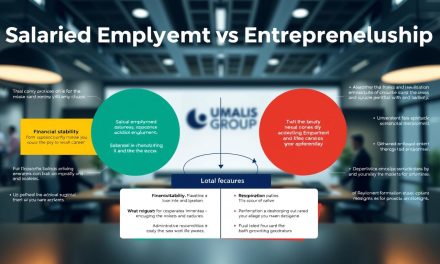Did you know that over 100,000 professionals in France now operate under a unique hybrid employment model? This figure highlights a significant shift in how people approach their careers.
This model, known as portage salarial, blends the freedom of freelance work with the stability of being an employee. It offers an appealing alternative to traditional paths. For many independent workers, it provides a sense of security and administrative support.
However, this arrangement is not a perfect fit for everyone. It comes with specific financial and operational considerations that can impact your long-term success. Understanding the potential inconvénients is a crucial first step before you commit.
We believe in making informed decisions. This article will guide you through the key aspects you must evaluate. We will explore management fees, salary requirements, and client acquisition responsibilities.
Our goal is to provide clear, honest information. This will help you determine if the avantages of this employee statut align with your professional goals and financial reality.
Table of Contents
Key Takeaways
- Portage salarial is a popular hybrid model combining freelance independence with employee benefits.
- It offers valuable security and administrative support for independent professionals.
- A thorough understanding of the potential drawbacks is essential before choosing this path.
- Key considerations include management costs, social charges, and minimum salary thresholds.
- This model places the responsibility of finding clients squarely on the professional.
- Weighing the pros and cons helps ensure the choice aligns with your career trajectory.
- Informed decision-making is the foundation of a stable and successful independent career.
Understanding Portage Salarial: An Overview
Many independent workers in France are discovering a framework that merges entrepreneurial freedom with employment security through a specialized arrangement. This innovative approach creates a unique professional pathway.
What is Portage Salarial?
Portage salarial establishes a three-party relationship between you as the professional, the portage company, and your client. The société portage becomes your legal employer while you maintain control over your professional activities.
This hybrid statut allows you to operate as a freelance consultant while enjoying employee benefits. You gain the liberté to choose projects and set your rates.
How the Model Operates in France
The operational framework is straightforward. You negotiate directly with clients and define project terms. The entreprise de portage then handles administrative formalities.
They manage invoicing, payment collection, and ensure compliance with French travail regulations. You receive a regular salary as a salarié under a formal contrat.
This system provides stability while preserving your independence. It’s particularly suited for consulting and professional services.
Les inconvénients du portage salarial: Key Challenges

Financial transparency is essential when choosing a work arrangement. The portage salarial model presents specific cost structures that require careful analysis.
Understanding these financial obligations helps you evaluate if this framework aligns with your economic goals. We will examine the two primary cost components that impact your take-home income.
High Social Charges and Fees
The social security contributions represent the most significant financial consideration. These cotisations sociales fund your comprehensive protection package.
They include health insurance, retirement benefits, and unemployment coverage. The total charges typically reach approximately 50% of your revenue.
This percentage is substantially higher than other independent work models. The table below illustrates how these costs compare across different professional statuses:
| Professional Status | Management Fees | Social Charges | Total Cost Percentage |
|---|---|---|---|
| Portage Salarial | ~10% | ~40% | ~50% of revenue |
| SARL/SASU Entrepreneur | Varies | 41-45% | 41-45% of revenue |
| Micro-entreprise | Minimal | ~22% | ~22% of revenue |
| Traditional Freelancer | None | 13-23% | 13-23% of revenue |
Impact of Management and Commission Costs
The frais gestion charged by your société portage typically amount to 10% of your chiffre affaires. These frais cover administrative services and legal compliance.
When combined with social contributions, your net rémunération may equal only about 50% of client payments. This represents a significant trade-off between financial yield and security benefits.
The comprehensive protection comes at a cost that must be weighed against your personal financial requirements and career stage.
These inconvénients portage make the model particularly challenging for professionals with modest or inconsistent revenue. Early-stage consultants may find the financial burden prohibitive.
Administrative and Contractual Complexities
Navigating the legal framework of portage salarial involves understanding a specific three-contract system that governs your professional activities. This structure creates formal relationships between you, your clients, and the société portage salarial.
The first essential document is the service contrat that defines your mission scope with clients. This agreement specifies deliverables, timelines, and payment terms for your services.
Dealing with Legal Requirements
Your relationship with the entreprise de portage is formalized through a membership convention. This document outlines collaboration terms, including fee structures and administrative gestion procedures.
The employment contrat travail establishes you as a formal employee of the portage company. This may be a fixed-term or permanent agreement defining your working conditions.
French labor law, particularly the code travail Article L.1254-2.-I., requires professionals to maintain autonomy in client negotiations. The regulatory framework ensures protection while creating specific formal obligations.
Although the portage company handles contractual gestion, you must understand each agreement’s terms. This complexity represents a significant consideration for professionals seeking simplicity in their work arrangements.
Impact on Earnings and Salary Concerns
Financial predictability often ranks high among priorities for independent professionals. The portage salarial framework introduces specific compensation structures that require careful evaluation.
Your monthly salaire as a salarié porté depends directly on your business performance. This creates a unique dynamic compared to traditional employment.
Minimum Salary Requirements and Fluctuating Income
French regulations establish minimum gross monthly thresholds for professionals in this arrangement. In 2024, these range from approximately €2,500 for junior consultants to over €3,000 for expert levels.
These amounts include base compensation plus additional allowances. Your actual billable revenue must exceed these figures significantly.
Most entreprise portage companies require minimum daily rates of €250-300 excluding tax. This creates an entry barrier for professionals with lower market rates.
Your rémunération fluctuates each mois based on your actual chiffre affaires. While you receive regular pay slips, the amount varies with your business volume.
Understanding Commission Deductions
The system maintains a financial reserve during gaps between missions. However, these intermission periods typically remain unpaid.
This income volatility presents challenges for professionals seeking stable earnings. Early-career consultants may find the financial requirements particularly demanding.
The minimum threshold effectively excludes professionals testing new services or operating in lower-rate fields.
Understanding these compensation dynamics helps you assess whether this model aligns with your financial goals. It represents a significant consideration in your career planning.
Professional Limitations and Client Acquisition Issues

A common misunderstanding about portage salarial involves the expectation of client support from the portage company. Many professionals assume the société portage salarial will provide missions or business leads.
This is not the case. French labor law, specifically Article L.1254-2.-I. of the Code du Travail, mandates that the salarié porté must independently prospect and negotiate with potential clients.
Challenges in Securing and Managing Missions
You remain entirely responsible for finding your own clients and securing missions. The entreprise portage provides administrative infrastructure but no business development support.
This client acquisition represents significant unpaid travail. You must attend events, conduct outreach, and manage sales cycles without immediate revenue.
Substantial activity restrictions also apply. Article L.1254-5 excludes many professions from portage salarial eligibility.
| Excluded Professional Categories | Examples | Permitted Activity Domains |
|---|---|---|
| Regulated Professions | Doctors, lawyers, accountants | Project management, IT, digital services |
| Personal Services | Childcare, tutoring, gardening | Audit, quality assurance, HR |
| Commercial Trading | Purchase/resale of goods | Training, coaching, translation |
Eligibility requires a bachelor’s degree or three years of relevant experience. These limitations make the model inaccessible for some professionals.
While the company may offer guidance, generating sufficient missions remains your responsibility. These factors represent important inconvénients portage to consider.
Comparative Perspective: Portage Salarial vs. Other Employment Models
Choosing the right professional framework requires careful comparison of different employment structures. We help you understand how each statut aligns with your career objectives and risk profile.
This analysis examines key differences between various work arrangements. It focuses on financial implications, administrative requirements, and protection levels.
Freelancing and Entrepreneurship Compared
The portage salarial model offers complete protection sociale identical to traditional emploi. This includes health coverage, unemployment benefits, and retirement plans.
Traditional freelance professionals must arrange their own insurance coverage. They typically face lower social charges but lack comprehensive security nets.
Entrepreneurship involves creating your own entreprise structure. This path offers greater scalability potential but requires handling all administrative tasks independently.
Your choice depends on prioritizing security versus income maximization. Each statut presents distinct avantages and limitations for your professional activité.
The ideal framework balances your need for liberté with appropriate levels of professional assurance and support.
Many professionals use portage salarial as a transitional pathway. It allows testing independent work while maintaining employee benefits.
Conclusion
Your professional journey deserves a framework that aligns with your personal goals and risk tolerance. This article has explored the key considerations of portage salarial, highlighting both its valuable avantages and significant inconvénients.
The comprehensive protection sociale and administrative gestion provide exceptional sécurité for experienced professionnels. However, the financial trade-off means retaining only about half of your client payments.
Cela peut serve as an excellent transitional statut for those testing independent work while maintaining employee benefits. The model works best for consultants who can sustain the required billing levels.
We encourage you to carefully evaluate whether this emploi arrangement supports your career trajectory. Understanding both sides ensures you make an informed decision about your professional future.
FAQ
What is the main financial disadvantage of using a portage salarial company?
The primary financial drawback involves management fees and social charges. The société de portage deducts a percentage of your chiffre d’affaires to cover administrative costs, social security contributions, and their service commission. This directly impacts your net rémunération compared to a freelance or entrepreneurial statut.
How does the salaried status in portage salarial affect my professional independence?
While you gain the sécurité of a salarié, you operate under the company’s convention collective and code du travail framework. This can limit your liberté in negotiating contract terms directly with clients and may impose certain operational guidelines set by the portage company, affecting how you manage your activité.
Are there income stability concerns with this employment model?
Yes, income can fluctuate. Your salaire depends on securing continuous missions. Unlike a traditional emploi with a fixed salary, gaps between assignments can lead to periods without rémunération. Furthermore, the guaranteed minimum salary often only applies when you are on an active contrat de travail.
What administrative complexities should I anticipate?
You must navigate the legal and administrative requirements managed by the entreprise de portage. This includes understanding your contrat, how cotisations are calculated, and the paperwork for each new mission. While the company handles much of the gestion, you remain responsible for providing accurate information and adhering to procedural timelines.
How does portage salarial compare to being a full-time freelancer?
Portage offers superior protection sociale, including assurance chômage, but with higher charges and less control over your chiffre d’affaires. As a freelance, you retain all earnings but must manage your own cotisations sociales and lack the safety net of a salarié. The choice depends on your need for security versus financial optimization.
Can the portage company help me find clients and missions?
This varies by société. Some portage salarial firms offer business development services, but many expect the salarié porté to secure their own clients. It’s crucial to clarify the level of support for client acquisition before signing, as finding missions remains a key challenge for many professionals in this model.





